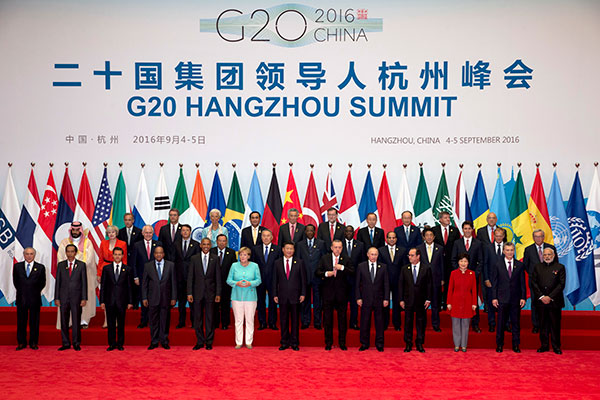
Leaders pose for pictures during the G20 Leaders Summit at the Hangzhou International Expo Center in Hangzhou, East China's Zhejiang province, on Sunday. WU ZHIYI/CHINA DAILY
G20 summits are assessed on two things: financial stability and economic growth, which form the G20's core agenda. [Special coverage]
In terms of financial stability, the G20 has made significant strides in terms of financial regulation, as well as on international taxation and reforms of global organizations like the International Monetary Fund.
This is still a work in progress, and we have weathered recent storms such as the market volatility this year and the Brexit vote in the United Kingdom. All these issues are being looked at in a global context, and we are seeing progress.
Economic growth, on the other hand, is a problem because strong, sustainable growth is still elusive.
This is a pivotal year not only for the G20 members, but for China as well. China has done all the right things early. The leadership has signaled that the G20 is a key Chinese foreign policy priority. China has put an emphasis on consulting widely and thinking deeply, and developed a broad agenda.
I expect China will deliver a technical agenda of positive, incremental change regarding the medium-term challenges and long-term economic issues.
China is already playing that role by presiding over the G20, and it knows the importance and magnitude of the group.
China has made important progress in economic governance. In the G20, it has made a lot of progress in a short time. A lot of people are looking to see what kind of leadership role will be seen at the summit.
The G20 group is not a mini United Nations. It is large enough to capture a big enough share of the global economy, population and trade, but small enough to facilitate agreement on key issues. It is informal and has two very clear mandates-financial stability and economic growth. For financial stability, it can get a tick, but on the other it has not done so well.
Critics see it as a talking shop, but it has set in place important changes that affect people's lives, especially in the financial sector, and in a number of key policies such as tax avoidance, which are starting to see some success.
China this year has invited the largest number of developing countries ever to attend G20 activities. By inviting developing countries, you give them a voice, which is a good thing. Decisions made by the G20 will impact on them as well.
The author Tristram Sainsbury is research fellow and project director, G20 Studies Centre, Lowy Institute, Australia.


















































